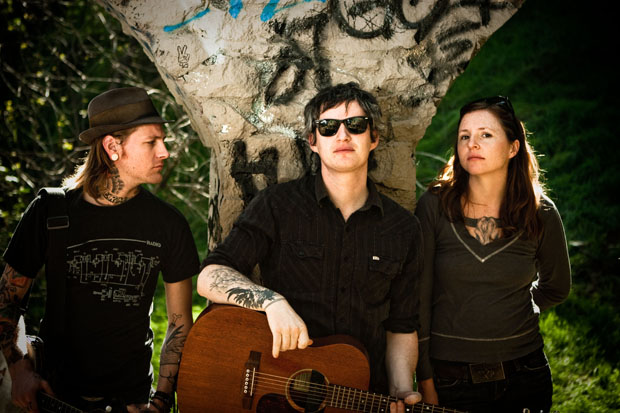Interview: Guitarists Pete Bernhard and Cooper McBean of The Devil Makes Three
All the latest guitar news, interviews, lessons, reviews, deals and more, direct to your inbox!
You are now subscribed
Your newsletter sign-up was successful

With their slightly punky perspective on vintage American blues, The Devil Makes Three, a trio that got their start in Vermont, are geared up to bring their unique mix of bluegrass, ragtime, country, folk and rockabilly to venues from coast to coast.
The drummer-less trio -– guitarist/frontman Pete Bernhard, stand-up bassist Lucia Turino and guitarist Cooper McBean –- delivers a genuine approach to acoustic music that is deeply steeped in rhythm.
Guitar World recently chatted with guitarists Bernhard and McBean to discuss the band's eclectic blend of styles and their latest album, 2009's Do Wrong Right.
GUITAR WORLD: What were -- and are -- your influences growing up and as you continue making music today?
I’m not really super up on new music, and I never really have been, so a lot of my influences are still older recording artists that have long since died, like Robert Johnson. I still love their music so much. It just really speaks to me. I guess when I was really young, I heard a lot of country/blues music and I just thought it was the greatest music out there. I just got really hooked on it, I just kind of still feel that way.
When I was young, most of my friends were into Metallica and Megadeth and stuff like that. And I was really into older blues music like slide guitar and blues. I was definitely the dork of the group.
I know you play a 1936 Gibson Recording King. What do you like about playing slide guitar?
All the latest guitar news, interviews, lessons, reviews, deals and more, direct to your inbox!
I love playing slide guitar. I played it when I was younger, like a lot of slide guitar like Muddy Waters and I guess I just wanted to be able to play similar to the people I’ve heard. Slide is just really fun. It’s sort of like a cheating instrument. You can kind of manipulate it, you can almost hit a note but not quite, and you can kind of slide in and hit the note correctly and slide out. As a guitar player, it kind of opens a lot of doors. For me, especially when I’m playing lead, it’s a way that I can try to do something, try and do a riff. If it doesn’t work, I can make it work.
I know you consider your live shows more like rock shows, yet you have a stand-up bass and banjos. How do you make it all work?
The biggest challenge has been amplifying a banjo. To get to the level we need to amplify is pretty loud, like the kind of shows we play is usually in a rock club. It’s strange; you'd think a banjo wouldn’t really fit in a rock concert. I think we play it a little more aggressively. I think Cooper plays it a little more aggressively. We kind of approach it more like you would a guitar.
You guys don’t clarify yourselves as one genre. You seem to be a combination of blues, folk and rock and more. How would describe your latest album? Is different than the others?
This last album is a combination of all the different influences. It’s a little bit more country than some of our previous records, like a little bit more country and bluegrass approach. But really all of our albums are all over the map, in terms of where each song is influenced from. We like to keep it that way, it keeps it interesting. Since we’re a three-piece band with no drummer, we like to keep it that way, so we try to diversify as much as we can.
A drummer-less trio is a rare thing. Also, trios in general were more common in the '70s and '80s, but you don’t see them that often today. Why do you think that is?
I don’t know. It seems like the trend now is bigger bands. It seems like people want more people on stage. They want a bigger sound live. I’ve always loved being in a small band. We really feel like it allows us to do more different things -- how we can play and how easily we can travel. We love it.
Cooper, I know how you play a wide variety of guitars, and you also play the banjo. Pete said you play kind of aggressively, especially on the 1923 Gibson Tenor banjo. What's your take on that?
I think my banjo technique, if a really good banjo player were to look at it, it would probably horrify them. Because we play in such loud environments, I tend to play harder, and I’m sort of trying to bring that back in. Largely, it’s sort of made up, just trying to duplicate things I listen to, figuring out how to do it myself. So you taught yourself. Where did that influence come from?I’ve always kind of listened to music with banjos in it. I’ve always really liked the banjo. But honestly a friend of ours that we were living with had a really beat-up, crappy kind of banjo. And Pete and I just picked it up and kind of played around with it, and we thought it might lend some variety to the band. So we just kind of stuck with it, learned some chords and went from there.Pete said a lot of his influences come from old-school musicians. Would you say the same?I think my banjo stuff comes form banjo players from the '20s and '30s like Eddie Peabody. That’s stuff that not a lot of people listen to anymore. But my guitar playing is across the board. A lot of the old blues and country players -- it's a big influence on me, all the way up to a lot of weird heavy metal bands nowadays. The Devil Makes Three have a live album, Stomp and Smash, coming out in October, and they'll be working on another studio album soon. They're also on tour:July 29: Mercury Lounge, New York, NY
July 30: Newport Folk Festival, Newport, RI
August 6: Petaluma Music Festival, Petaluma, CA
